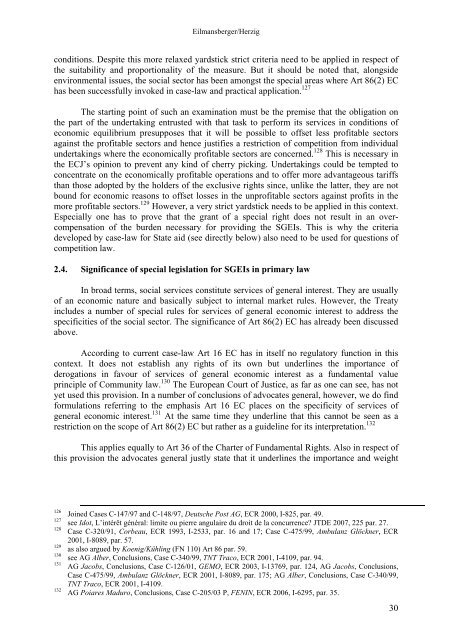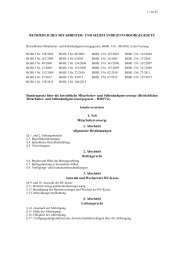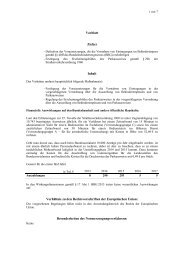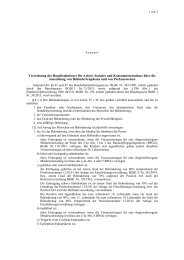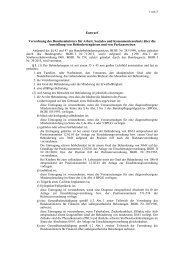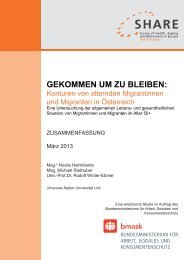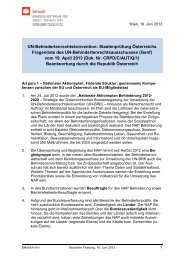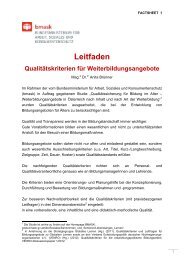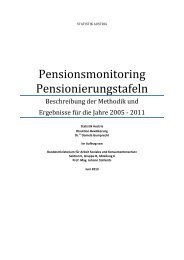Social Services of General Interest (SSGI)
Social Services of General Interest (SSGI)
Social Services of General Interest (SSGI)
Create successful ePaper yourself
Turn your PDF publications into a flip-book with our unique Google optimized e-Paper software.
Eilmansberger/Herzig<br />
conditions. Despite this more relaxed yardstick strict criteria need to be applied in respect <strong>of</strong><br />
the suitability and proportionality <strong>of</strong> the measure. But it should be noted that, alongside<br />
environmental issues, the social sector has been amongst the special areas where Art 86(2) EC<br />
has been successfully invoked in case-law and practical application. 127<br />
The starting point <strong>of</strong> such an examination must be the premise that the obligation on<br />
the part <strong>of</strong> the undertaking entrusted with that task to perform its services in conditions <strong>of</strong><br />
economic equilibrium presupposes that it will be possible to <strong>of</strong>fset less pr<strong>of</strong>itable sectors<br />
against the pr<strong>of</strong>itable sectors and hence justifies a restriction <strong>of</strong> competition from individual<br />
undertakings where the economically pr<strong>of</strong>itable sectors are concerned. 128 This is necessary in<br />
the ECJ’s opinion to prevent any kind <strong>of</strong> cherry picking. Undertakings could be tempted to<br />
concentrate on the economically pr<strong>of</strong>itable operations and to <strong>of</strong>fer more advantageous tariffs<br />
than those adopted by the holders <strong>of</strong> the exclusive rights since, unlike the latter, they are not<br />
bound for economic reasons to <strong>of</strong>fset losses in the unpr<strong>of</strong>itable sectors against pr<strong>of</strong>its in the<br />
more pr<strong>of</strong>itable sectors. 129 However, a very strict yardstick needs to be applied in this context.<br />
Especially one has to prove that the grant <strong>of</strong> a special right does not result in an overcompensation<br />
<strong>of</strong> the burden necessary for providing the SGEIs. This is why the criteria<br />
developed by case-law for State aid (see directly below) also need to be used for questions <strong>of</strong><br />
competition law.<br />
2.4. Significance <strong>of</strong> special legislation for SGEIs in primary law<br />
In broad terms, social services constitute services <strong>of</strong> general interest. They are usually<br />
<strong>of</strong> an economic nature and basically subject to internal market rules. However, the Treaty<br />
includes a number <strong>of</strong> special rules for services <strong>of</strong> general economic interest to address the<br />
specificities <strong>of</strong> the social sector. The significance <strong>of</strong> Art 86(2) EC has already been discussed<br />
above.<br />
According to current case-law Art 16 EC has in itself no regulatory function in this<br />
context. It does not establish any rights <strong>of</strong> its own but underlines the importance <strong>of</strong><br />
derogations in favour <strong>of</strong> services <strong>of</strong> general economic interest as a fundamental value<br />
principle <strong>of</strong> Community law. 130 The European Court <strong>of</strong> Justice, as far as one can see, has not<br />
yet used this provision. In a number <strong>of</strong> conclusions <strong>of</strong> advocates general, however, we do find<br />
formulations referring to the emphasis Art 16 EC places on the specificity <strong>of</strong> services <strong>of</strong><br />
general economic interest. 131 At the same time they underline that this cannot be seen as a<br />
restriction on the scope <strong>of</strong> Art 86(2) EC but rather as a guideline for its interpretation. 132<br />
This applies equally to Art 36 <strong>of</strong> the Charter <strong>of</strong> Fundamental Rights. Also in respect <strong>of</strong><br />
this provision the advocates general justly state that it underlines the importance and weight<br />
126<br />
Joined Cases C-147/97 and C-148/97, Deutsche Post AG, ECR 2000, I-825, par. 49.<br />
127<br />
see Idot, L’intérêt général: limite ou pierre angulaire du droit de la concurrence? JTDE 2007, 225 par. 27.<br />
128<br />
Case C-320/91, Corbeau, ECR 1993, I-2533, par. 16 and 17; Case C-475/99, Ambulanz Glöckner, ECR<br />
2001, I-8089, par. 57.<br />
129<br />
as also argued by Koenig/Kühling (FN 110) Art 86 par. 59.<br />
130<br />
see AG Alber, Conclusions, Case C-340/99, TNT Traco, ECR 2001, I-4109, par. 94.<br />
131<br />
AG Jacobs, Conclusions, Case C-126/01, GEMO, ECR 2003, I-13769, par. 124, AG Jacobs, Conclusions,<br />
Case C-475/99, Ambulanz Glöckner, ECR 2001, I-8089, par. 175; AG Alber, Conclusions, Case C-340/99,<br />
TNT Traco, ECR 2001, I-4109.<br />
132<br />
AG Poiares Maduro, Conclusions, Case C-205/03 P, FENIN, ECR 2006, I-6295, par. 35.<br />
30


